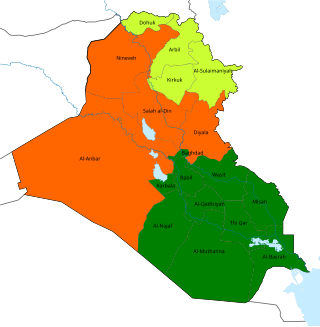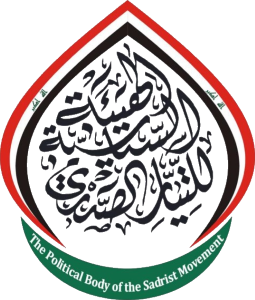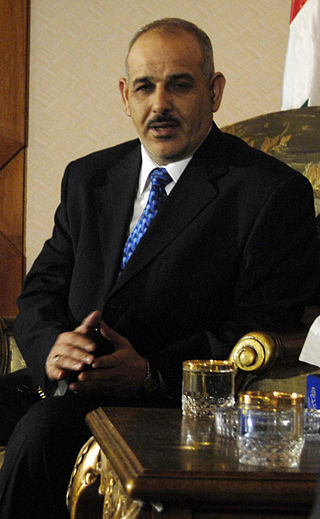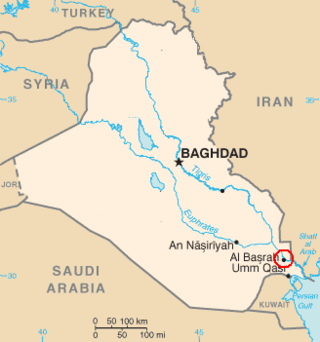| |||||||||||||||||||||||||||||||||||||||||||||||||||||||||||||||||||||||||||
All 35 seats for the Baghdad Governorate council | |||||||||||||||||||||||||||||||||||||||||||||||||||||||||||||||||||||||||||
|---|---|---|---|---|---|---|---|---|---|---|---|---|---|---|---|---|---|---|---|---|---|---|---|---|---|---|---|---|---|---|---|---|---|---|---|---|---|---|---|---|---|---|---|---|---|---|---|---|---|---|---|---|---|---|---|---|---|---|---|---|---|---|---|---|---|---|---|---|---|---|---|---|---|---|---|
| |||||||||||||||||||||||||||||||||||||||||||||||||||||||||||||||||||||||||||
| |||||||||||||||||||||||||||||||||||||||||||||||||||||||||||||||||||||||||||
The Basra governorate election of 2009 was held on 31 January 2009 alongside elections for all other governorates outside Iraqi Kurdistan and Kirkuk.
| |||||||||||||||||||||||||||||||||||||||||||||||||||||||||||||||||||||||||||
All 35 seats for the Baghdad Governorate council | |||||||||||||||||||||||||||||||||||||||||||||||||||||||||||||||||||||||||||
|---|---|---|---|---|---|---|---|---|---|---|---|---|---|---|---|---|---|---|---|---|---|---|---|---|---|---|---|---|---|---|---|---|---|---|---|---|---|---|---|---|---|---|---|---|---|---|---|---|---|---|---|---|---|---|---|---|---|---|---|---|---|---|---|---|---|---|---|---|---|---|---|---|---|---|---|
| |||||||||||||||||||||||||||||||||||||||||||||||||||||||||||||||||||||||||||
| |||||||||||||||||||||||||||||||||||||||||||||||||||||||||||||||||||||||||||
The Basra governorate election of 2009 was held on 31 January 2009 alongside elections for all other governorates outside Iraqi Kurdistan and Kirkuk.
One seat in the election is reserved for Assyrian Christians [1]
Basra is the main oil-producing and transit centre in Iraq, which has led to intense competition over control of its Governorate. [2] It has been the centre of competition between the al-Maliki Federal government, which controls the police and army, the Islamic Virtue Party Governor of Basra which controls the Oil Protection Corps and local militias from the Sadrist Movement and Tharallah. Following the Battle of Basra in 2008, the central government seized control of the city's streets from the Sadrist Movement and the security situation improved.
In April 2007, SIIC successfully brought a no-confidence motion against Governor Waili. This dismissal was ratified by Prime Minister Nouri al-Maliki in July, but eventually overturned by the Supreme Court. [2]
The central government has organized " Local Support Committee " militias, has spent $100 million in reconstruction projects and has started paying unemployment benefits in the province. This was expected to lead to an increased support for Prime Minister Nouri al-Maliki's Islamic Dawa Party. [2]
Meanwhile, the Islamic Virtue Party dropped Waeli from its candidate list, reportedly due to his "polarizing" effect. [2]
In a move away from their traditional apolitical stance, a list with a core support from the Shaykhiya religious community stood for the first time. [3]
In November 2008 Wael Abdul Latif, an Independent Islamist MP backed by tribal Sheikhs, submitted a petition to the Electoral Commission of Iraq signed by 34,800 people calling for a vote on a Region of Iraq covering only the governorate of Basrah. [4] The Sadrist movement opposed the move, saying it was "playing with fire" as did the Islamic Dawa Party of Prime Minister Nouri al-Maliki. SCIRI remained neutral, as it supports a nine-province Region covered the whole of southern Iraq. As the petition was signed by more than 2% of the population, the commission published an official request for signatures; if more than 10% of the population had signed it before 15 January 2009, a referendum would have been held within 15 days. [5] [6] In the event, the initiative failed to reach 10% and was struck down by the Electoral Commission. Backers accused the al-Maliki federal government of blocking their media campaign and appealed the decision to the Federal Court. [7]
| Coalition 2005/2009 | Allied national parties | Leader | Seats (2005) | Seats (2009) | Change | Votes |
|---|---|---|---|---|---|---|
| State of Law Coalition | Islamic Dawa Party | Nouri Al-Maliki | 3 | 20 | +17 | 239,007 |
| Al Mihrab Martyr List | ISCI | Abdul Aziz al-Hakim | 20 | 5 | -15 | 74,879 |
| Gathering of Justice and Unity | - | 2 | +2 | 34,862 | ||
| Independent Free Movement List | Sadrist Movement | Muqtada al-Sadr | 2 | 2 | - | 32,020 |
| Iraqi Islamic Party | Iraqi Islamic Party | Tariq al-Hashimi | - | 2 | +2 | 24,817 |
| Iraqi National List | Iraqi National Accord | Iyad Allawi | 4 | 2 | -2 | 21,091 |
| Islamic Virtue Party | Islamic Virtue Party | Abdelrahim Al-Husseini | 12 | 1 | -11 | 20,932 |
| Chaldean Democratic Union Party (Assyrian reserved seat) | CDUP | Ablahad Afraim Sawa | - | 1 | +1 | 227 |
| Other Parties | 198,274 | |||||
| Total | 41 | 35 | -6 | 646,109 | ||
| Sources: this article - Al Sumaria - New York Times - [8] | ||||||
Iraq is a federal parliamentary representative democratic republic. It is a multi-party system whereby the executive power is exercised by the Prime Minister of the Council of Ministers as the head of government, the President of Iraq as the head of state, and legislative power is vested in the Council of Representatives.

The National Iraqi Alliance, also known as the Watani List, is an Iraqi electoral coalition that contested the 2010 Iraqi legislative election. The Alliance is mainly composed of Shi'a Islamist parties. The alliance was created by the Supreme Council for Islamic Revolution in Iraq to contest in the January 2005 and December 2005 under the name United Iraqi Alliance, when it included all Iraq's major Shi'a parties. The United Iraqi Alliance won both those of elections however later fell apart after several major parties left the alliance due to disputes with Prime Minister Nouri al-Maliki and the Supreme Council.

Parliamentary elections were held in Iraq on 15 December 2005, following the approval of a new constitution in a referendum of 15 October.

Governorate council elections were held in Iraq on 30 January 2005, the same day as the elections for the transitional Iraqi National Assembly. Each province has a 41-member council, except for Baghdad, whose council has 51 members.
The first government of Iraq led by Prime Minister Nouri al-Maliki took office on May 20, 2006 following approval by the members of the Iraqi National Assembly. This followed the general election in December 2005. The government succeeded the Iraqi Transitional Government which had continued in office in a caretaker capacity until the new government was formed and confirmed.

The Sadrist Movement is an Iraqi Shi'a Islamic national movement and political party, led by Muqtada al-Sadr.

Jawad al-Bulani served as the Interior Minister of Iraq within the Council of Ministers under Iraqi Prime Minister Nouri al-Maliki from 8 June 2006 to 21 December 2010. Bulani is a Shi'a independent member of the United Iraqi Alliance.
The government of Iraq has established a committee to consider a proposed amendment to the Constitution of Iraq.

Governorate or provincial elections were held in Iraq on 31 January 2009, to replace the local councils in fourteen of the eighteen governorates of Iraq that were elected in the 2005 Iraqi governorate elections. 14,431 candidates, including 3,912 women, contested 440 seats. The candidates came from over 400 parties, 75% of which were newly formed.

The Battle of Basra began on 25 March 2008, when the Iraqi Army launched an operation to drive the Mahdi Army militia out of the southern Iraqi city of Basra. The operation was the first major operation to be planned and carried out by the Iraqi Army since the invasion of 2003.

Parliamentary elections were held in Iraq on 7 March 2010. The elections decided the 325 members of the Council of Representatives who would elect the prime minister and president. The elections resulted in a partial victory for the Iraqi National Movement, led by former Interim Prime Minister Ayad Allawi, which won 91 seats, making it the largest alliance in the Council. The State of Law Coalition, led by incumbent Prime Minister Nouri Al-Maliki, was the second largest grouping with 89 seats.

The State of Law Coalition, also known as Rule of Law Coalition, is an Iraqi political coalition formed for the 2009 Iraqi governorate elections by the Prime Minister of Iraq at the time, Nouri al-Maliki, of the Islamic Dawa Party.
Since the early 20th century several proposals have been made for the establishment of an autonomous area or an independent state for the Syriac-speaking Assyrians in northern Iraq.
This article concerns the formation process of the Al Maliki I Government of Iraq in the aftermath of the Iraq National Assembly being elected on December 15, 2005. Due to disputes over alleged vote-rigging the results of the election were only certified by the Independent Electoral Commission of Iraq on February 10, 2006.
In the aftermath of the 2010 election, great attention was given to the decision on who should be the next Iraqi PM. Both al-Iraqiyya's Allawi and the State of Law coalition's al-Maliki laid claim to the post, so it was seen as up to the Kurdish parties and the Iraqi National Alliance to decide this matter.

Parliamentary elections were held in Iraq on 30 April 2014. The elections decided the 328 members of the Council of Representatives who will in turn elect the Iraqi president and prime minister.

The Al-Ahrar Bloc is an Iraqi Shia Islamist political coalition formed for the 2014 Iraqi parliamentary election. It is headed by Dia Najem Abdallah al-Asadi.
Establishing a federal region south of Iraq, called Basra Federal Region is supported by a number of Iraqi political parties. The Iraqi constitution allows any province to become a region with independent powers.
Jaafar Mohammed Baqir al-Sadr is an Iraqi politician with the Shiite Islamist Islamic Dawa Party.

Jaysh al-Mu'ammal, also known as Liwa al-Mu'ammal or as the Popular Mobilization Forces' 99th Brigade, is a Shia Islamist Iraqi private militia that is led by Sa'ad Sawar and has fought in the Syrian Civil War and Iraqi Civil War. Founded as a splinter faction of the Sadrist Movement, Jaysh al-Mu'ammal is supported by Iran and former Iraqi Prime Minister Nouri al-Maliki.